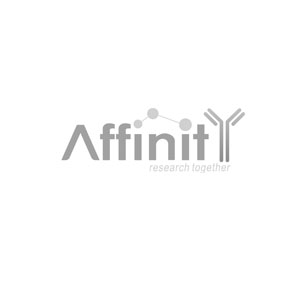TNIP3 Antibody - #DF9083
| Product: | TNIP3 Antibody |
| Catalog: | DF9083 |
| Description: | Rabbit polyclonal antibody to TNIP3 |
| Application: | WB IHC IF/ICC |
| Reactivity: | Human, Mouse |
| Mol.Wt.: | 39 kDa; 39kD(Calculated). |
| Uniprot: | Q96KP6 |
| RRID: | AB_2842279 |
Product Info
*The optimal dilutions should be determined by the end user.
*Tips:
WB: For western blot detection of denatured protein samples. IHC: For immunohistochemical detection of paraffin sections (IHC-p) or frozen sections (IHC-f) of tissue samples. IF/ICC: For immunofluorescence detection of cell samples. ELISA(peptide): For ELISA detection of antigenic peptide.
Cite Format: Affinity Biosciences Cat# DF9083, RRID:AB_2842279.
Fold/Unfold
A20 binding inhibitor of NF kappa B activation 3; ABIN 3; ABIN 3 beta; FLJ21162; LIND; Listeria induced; Listeria induced gene protein; TNFAIP3 interacting protein 3; TNFAIP3 interacting protein 3 beta; TNIP3; TNIP3 beta;
Immunogens
Highly expressed in lung, lymph node, thymus and fetal liver. Expressed at lower levels in bone marrow, brain, kidney, spleen, leukocytes and tonsils. Could be detected in heart, salivary gland, adrenal gland, pancreas, ovary and fetal brain. High levels detected in liver, colon, small intestine, muscle, stomach, testis, placenta, thyroid, uterus, prostate, skin and PBL.
- Q96KP6 TNIP3_HUMAN:
- Protein BLAST With
- NCBI/
- ExPASy/
- Uniprot
MAHFVQGTSRMIAAESSTEHKECAEPSTRKNLMNSLEQKIRCLEKQRKELLEVNQQWDQQFRSMKELYERKVAELKTKLDAAERFLSTREKDPHQRQRKDDRQREDDRQRDLTRDRLQREEKEKERLNEELHELKEENKLLKGKNTLANKEKEHYECEIKRLNKALQDALNIKCSFSEDCLRKSRVEFCHEEMRTEMEVLKQQVQIYEEDFKKERSDRERLNQEKEELQQINETSQSQLNRLNSQIKACQMEKEKLEKQLKQMYCPPCNCGLVFHLQDPWVPTGPGAVQKQREHPPDYQWYALDQLPPDVQHKANGLSSVKKVHP
PTMs - Q96KP6 As Substrate
| Site | PTM Type | Enzyme | Source |
|---|---|---|---|
| K39 | Methylation | Uniprot | |
| Y68 | Phosphorylation | Uniprot | |
| T195 | Phosphorylation | Uniprot |
Research Backgrounds
Binds to zinc finger protein TNFAIP3 and inhibits NF-kappa-B activation induced by tumor necrosis factor, Toll-like receptor 4 (TLR4), interleukin-1 and 12-O-tetradecanoylphorbol-13-acetate. Overexpression inhibits NF-kappa-B-dependent gene expression in response to lipopolysaccharide at a level downstream of TRAF6 and upstream of IKBKB. NF-kappa-B inhibition is independent of TNFAIP3 binding.
Highly expressed in lung, lymph node, thymus and fetal liver. Expressed at lower levels in bone marrow, brain, kidney, spleen, leukocytes and tonsils. Could be detected in heart, salivary gland, adrenal gland, pancreas, ovary and fetal brain. High levels detected in liver, colon, small intestine, muscle, stomach, testis, placenta, thyroid, uterus, prostate, skin and PBL.
Interacts with TNFAIP3. Interacts with polyubiquitin.
Restrictive clause
Affinity Biosciences tests all products strictly. Citations are provided as a resource for additional applications that have not been validated by Affinity Biosciences. Please choose the appropriate format for each application and consult Materials and Methods sections for additional details about the use of any product in these publications.
For Research Use Only.
Not for use in diagnostic or therapeutic procedures. Not for resale. Not for distribution without written consent. Affinity Biosciences will not be held responsible for patent infringement or other violations that may occur with the use of our products. Affinity Biosciences, Affinity Biosciences Logo and all other trademarks are the property of Affinity Biosciences LTD.
